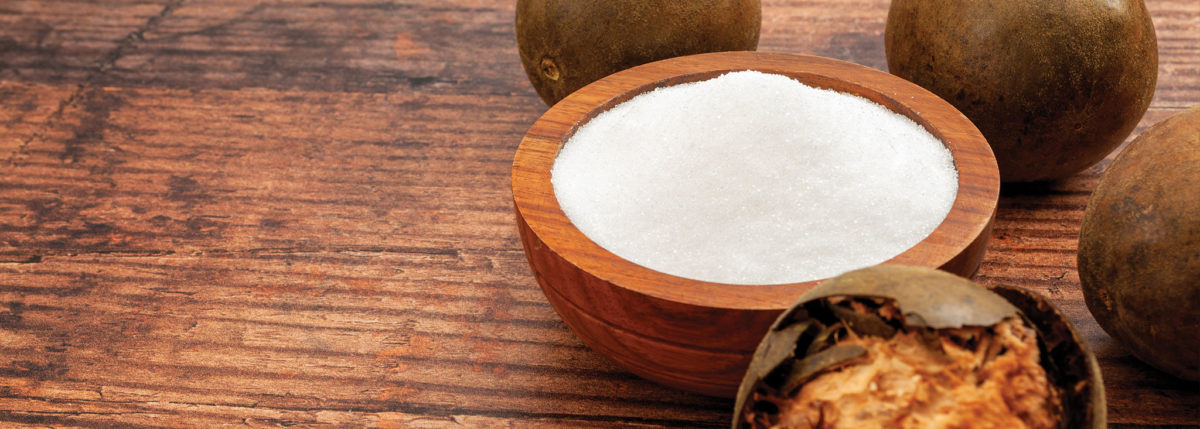Monk Fruit Sweeteners and Type 2 Diabetes
Monk Fruit, also known as lo han guo, is one of the most popular and most used sweeteners recently. Sweeteners, as we have mentioned before, are chemicals that add a sweet taste to food and beverages. They are classified as nutritious and non-nutritious, the latter’s nutritional content has little or no effect on blood glucose levels for people living with diabetes.
Monk fruit is currently used more frequently for the preparation of desserts for people who follow a keto diet or people living with diabetes who seek foods and preparations that are low in carbohydrates.
Monk fruit originated in China and Indonesia. It is one of the seven species belonging to the Siraitia genus. Out of these seven species, the Siraitia grosvenorii fruit, is what we know as Monk fruit.
What monk fruit is made of
This plant contains several bioactive compounds that are considered good for your health, and although it is traditionally used as a natural sweetener in regions like China, it is also used as a remedy to nourish the lungs, treat heat stroke, intense thirst, constipation, sore throat, cough and for cold weather.
Monk fruit is rich in many compounds that have high biological effects and a sweet taste. These compounds are part of a substance called mogrol that contains glucose molecules. Although not much is known about how it is metabolized by humans, the effects are believed to be the same or similar to those found in animal studies.
Monk fruit and digestion
It has been found that it is not absorbed by the upper gastrointestinal tract and does not provide calories. When they reach the colon, gut microbes break away from glucose molecules and use them as an energy source. Monk fruit and some metabolites that are produced during digestion are mostly eliminated from the gastrointestinal tract, while small amounts are absorbed into the bloodstream and excreted in the urine. This is good news as they do not have a direct impact on blood glucose since they are not absorbed.
How sweet is monk fruit?
Monk fruit-based sweeteners are 150-200 times sweeter than sugar and add sweetness to foods and beverages without adding calories. They are generally used in beverages and foods such as soft drinks, juices, dairy products, desserts, candy and condiments. Another advantage that monk fruit has over other sweeteners is that it is stable at high temperatures, which means it can be used for baking without changing the taste or making the final product bitter. Also, like all zero-calorie and low-calorie sweeteners, only very small amounts are needed to achieve the same sweetness as sugar.
Regarding safety, monk fruit sweeteners have been listed as permitted sweeteners by Health Canada.
Benefits of monk fruit
- A small amount provides a lot of sweetness.
- It does not raise blood sugar levels.
- It helps to reduce total calorie intake when it is used instead of sugar.
- It is safe and has been approved by Health Canada.
Its effect on the intestinal microbiota is still being studied, but it is a good substitute for sugar if you want sweetness, although it is not easy to find it in a pure form without being mixed with other types of sweeteners. When mixed with another type of sweetener, the effect on blood glucose should be taken under consideration as well as its effects on the body, so adopting a healthy and active lifestyle that adapts to personal goals and priorities is vital for your well-being.
Conclusion
Choosing foods and beverages with low-calorie sweeteners such as monk fruit can be a tool to help control sugar intake and keep calories in check, which are important components for maintaining a healthy body weight and reducing the risk of developing diseases. However, it is still an added chemical compound, so we cannot stop emphasizing that it is better to use it sporadically.
Reach out to your team of healthcare professionals to discuss including this option in your meal plan.
References:
Sugar substitutes. (n.d.). ADA. https://www.diabetes.org/nutrition/understanding-carbs/get-to-know-carbs/sugar-substitutes
Everything you need to know about monk fruit sweeteners. (2019, April 25). Food Insight. https://foodinsight.org/everything-you-need-to-know-about-monk-fruit-sweeteners/





